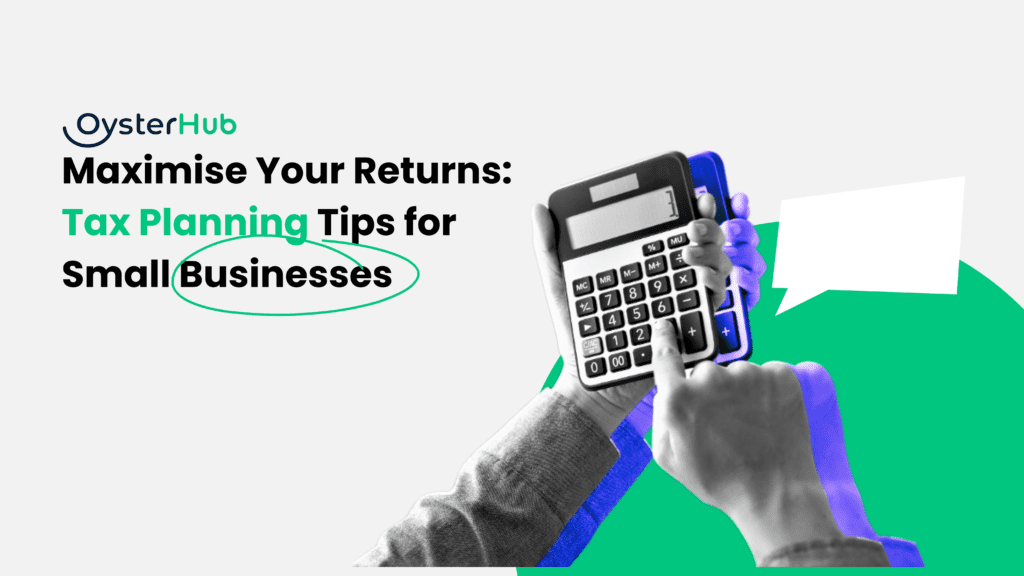Introduction
Are you a small business trying to maximise returns? Small businesses grapple with complex tax codes, Balancing cash flow amid IRS deadlines imposes, Record-keeping burdens and deductions unknown, Tax experts’ costs often leave them on their own.
Effective tax planning is a financial strategy that can significantly benefit small businesses. When done correctly, it can help you minimise your tax liability, increase your returns, and keep your finances in order.
In this blog post, we’ll explore essential tax planning tips for small businesses to help you make the most of your financial resources.
All You Need To Know About Small Business Taxes

Before diving into tax planning tips for small businesses, let’s briefly review the types of taxes small businesses commonly encounter:
1. Income Tax:
Income tax is a fundamental tax that businesses must pay on the profits they earn. It’s a direct tax levied on the income generated by your business operations. Income tax obligations vary depending on your business structure, such as sole proprietorship, partnership, LLC, or corporation.
2. Goods and Services Tax (GST):
The Goods and Services Tax is a value-added tax of 10% that applies to most goods and services sold in Australia. Small businesses with an annual turnover of $75,000 or more (or $150,000 for nonprofit organisations) are required to register for and collect GST. They must also submit regular Business Activity Statements (BAS) to report GST collected and paid.
3. Pay-As-You-Go (PAYG) Withholding:
Small businesses that employ staff are required to withhold and remit income tax from their employees’ wages and salaries. The PAYG withholding system ensures that tax is withheld and paid to the Australian Taxation Office (ATO) on behalf of employees.
4. Payroll Tax:
Payroll tax is a state-based tax imposed on businesses with total annual wages above a certain threshold. The threshold and rates vary from state to state. Small businesses should be aware of the payroll tax requirements in their specific state or territory.
5. Superannuation Guarantee (SG):
Employers are legally required to make superannuation contributions on behalf of their eligible employees. The Superannuation Guarantee ensures that employees receive retirement savings contributions from their employers.
6. Fringe Benefits Tax (FBT):
If a small business provides certain non-cash benefits to employees (such as company cars or accommodation), they may be liable for FBT. The FBT rate is separate from the income tax rate and is assessed on the taxable value of fringe benefits provided.
7. Capital Gains Tax (CGT):
When a small business sells an asset, such as real estate or shares, it may be subject to CGT on any capital gain made from the sale. Special concessions and exemptions are available for small businesses selling active assets.
Tax Planning Tips For Small Businesses
Effective tax planning isn’t a last-minute endeavor. Here’s why you should start early and maintain a year-round approach:
- Better Decision-Making: Early planning allows you to make informed financial decisions.
- Avoid Last-Minute Stress: Rushed tax planning can lead to errors and missed opportunities.
- Maximise Deductions: Planning throughout the year helps you identify and maximise deductions
Here is how you can get started with effective tax planning for small businesses:
A. Choose the Right Business Structure:
Consider consulting with a qualified tax professional or accountant who is well-versed in Australian tax laws to determine which business structure is most tax-efficient for your specific situation.
Keep in mind that your choice of business structure can impact not only your income tax but also your liability and ability to access certain tax concessions and incentives. If you are confused as to which structure fits you, contact us today to get a detailed review.
B. Importance of Accurate Financial Records:
Invest in reliable accounting software or hire a certified accountant with expertise in Australian tax regulations to maintain accurate financial records.
Keep records of all financial transactions, including income, expenses, receipts, and invoices. It is advised to regularly reconcile your financial records to ensure they align with your bank statements.
C. Claiming All Eligible Deductions:
One of the most under rated tip for maximising tax benefits for small businesses in Australia is claiming tax deductions. Familiarise yourself with the tax deductions available to small businesses in Australia. Common deductions include those related to operating expenses, depreciation on assets, and motor vehicle expenses.
Keep detailed and well-organised records of your business expenses, as the Australian Taxation Office (ATO) may require documentation to substantiate deductions.
D. Leverage Your Tax Credits:
Research tax credits that may be applicable to your business, such as the Research and Development (R&D) Tax Incentive or Small Business Instant Asset Write-Off. Ensure you meet the eligibility criteria and comply with any reporting requirements associated with claiming tax credits.
E. Manage Your Payroll Taxes Effectively:
Use reliable payroll software or consider outsourcing your payroll to a reputable service provider to ensure accurate and compliant payroll tax calculations. Stay up-to-date with changes in payroll tax rates, thresholds, and legislation, as they can vary between states and territories in Australia.
The crux is to understand your obligations regarding employee superannuation contributions and reporting.
F. Focus on Retirement and Benefit Plans:
Explore tax-advantaged retirement and benefit plans for your employees, such as the Superannuation Guarantee (SG) system in Australia. Consider seeking advice from a financial advisor or superannuation specialist to design and implement a retirement and benefit plan that aligns with your business goals and provides tax advantages.
How Can We Help in Maximising Your Tax?

We come up with simplifying Small Business Taxation in Australia. Our services are designed to help you with maximising your returns. We also take care of and offer tax planning tips for small businesses.
Here is a list of all the things we can do for you:
- Oyster Hub offers personalised consultations to help you choose the ideal business structure, optimising your tax situation.
- We provide user-friendly accounting services and expert accountants to ensure meticulous record-keeping for tax compliance.
- Our tax specialists leave no deduction unexplored, helping you maximise your claims while meeting ATO requirements.
- Oyster Hub keeps you updated on available tax credits, guiding you through applications and compliance.
- We simplify payroll tax management with integrated software or through trusted payroll service partners.
- Oyster Hub assists in creating tax-efficient employee benefit packages.
We have extensive experience collaborating with diverse industries, thanks to our knowledgeable team of experts who can offer immediate assistance. Our commitment to round-the-clock availability means our lines are open 24/7 to address any queries or concerns you may have.
Conclusion
Effective tax planning tips for small business is a vital aspect of financial success for small businesses. Consider consulting a tax professional to tailor these tips to your specific business needs and objectives.
Partner with Oyster Hub to simplify tax planning, compliance, and financial management, allowing your small business to thrive with confidence in Australia’s ever-changing tax landscape.
So wait no longer, connect with us today to get the best out of your returns!


















